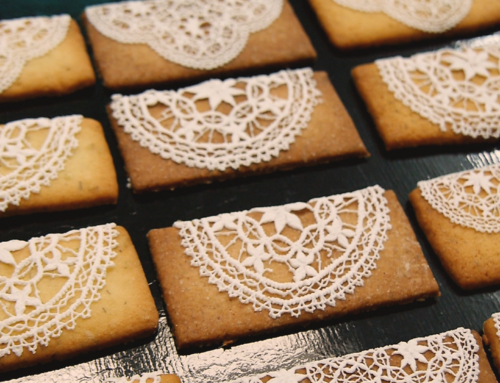Pouco sabemos sobre como começaram os Pastéis de Peniche. Há quem afirme que sejam conventuais, mas não encontramos dados concretos para o comprovar. O recheio de amêndoa e gemas faz lembrar o recheio dos Pastéis de Santa Clara, enquanto que a massa faz lembrar as azevias, tipicamente feitas no Natal, um pouco por todo o país.
As irmãs Ida e Graciete Guilherme contam que este doce lhes foi passado pela mãe, Maria da Conceição, que por sua vez aprendeu com Maria Isabel Roque, de Peniche, uma senhora nessa altura já bastante idosa. Ao ver que a idade já não a deixava fazer doces, ensinou a Sr.ª Maria da Conceição a fazê-los. Em troca, esta comprometeu-se a dar-lhe metade dos lucros da venda dos doces enquanto fosse viva. E assim foi.
Entretanto, as irmãs Ida e Graciete aprendiam, desde pequenas, com a mãe. É mais uma tradição doceira que passou de mãos em mãos femininas até aos dias de hoje. Podem encontrar este pastel em algumas pastelarias de Peniche, mas são sobretudo feitos por doceiros particulares. Sugerimos que o apreciem junto ao mar.
···
We know little about how the Pastéis de Peniche began. Some say they come from a convent, but we found no actual data to confirm it. The filling, which is made of almonds and yolks, resembles that of the Pastéis de Santa Clara, while the dough resembles the “azevias”, typically made in Christmas throughout the country.
Ida Guilherme and her sister, Graciete, tell us that this sweet was passed on to them by their mother, who in turn had learned how to make them from Peniche local Maria Isabel Roque, a lady of considerable age at the time. Seeing that her old age didn’t allow her to make sweets as before, she taught Mrs. Maria da Conceição to make them. In exchange, the latter lady committed to give the former half the profits of the sales of those sweets, while the latter was alive. And that’s how things went.
Meanwhile, sisters Ida and Graciete were learning with their mother since they were little. It is yet one more confectionery tradition that has passed on from feminine hand to feminine hand, up to today. You can find this sweet in some pastry shops in Peniche, but they are mostly made by private confectioners. We suggest you to have it by the sea.
PUBLICIDADE

